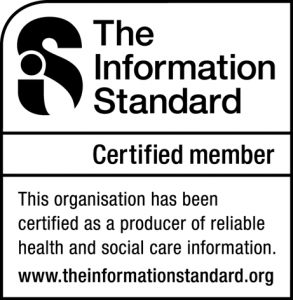
- Information and Support
- About Sickle Cell and Trait
- CAMPAIGNING
- Blood Donation
- Children’s Activities
- Clinical Trials and Research
- The Sickle Cell Society Podcast
- Coronavirus (COVID-19)
- Parvo Virus and Sickle Cell
- Hackney Engagement Project
- Helpline
- Heritage Project
- Mentoring
- Resources
- Screening Programme
- Self Over Sickle
- Support Groups and Local Services
- About Us
- Get Involved
- News & Contact
- Help and Advice
- DONATE NOW
Priapism
Home » Priapism

Priapism
This page contains a simple overview of Priapism. We will continue to update and change this page as more information becomes available.
What is Priapism?

The majority of males with sickle cell anaemia (HbSS) are likely to experience a priapism in their life time. However, Priapism is less common in males with sickle cell disease (HbSC+) and sickle beta thalassaemia (HbSB+).
Did you know that there are two common types of priapism?
- Intermittent
- Persistent (or fulminant).
At what age am I likely to experience Priapism?
Typically most males first experience priapism during early puberty. They can continue to experience priapism into their 30s and 40s.
What is the difference between intermittent and persistent priapism?
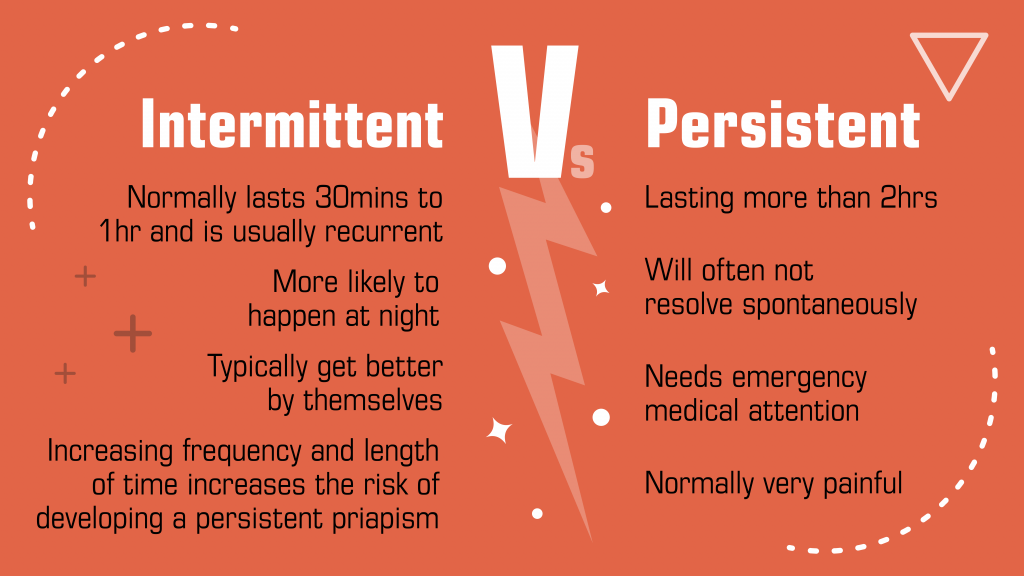
Why does priapism happen?
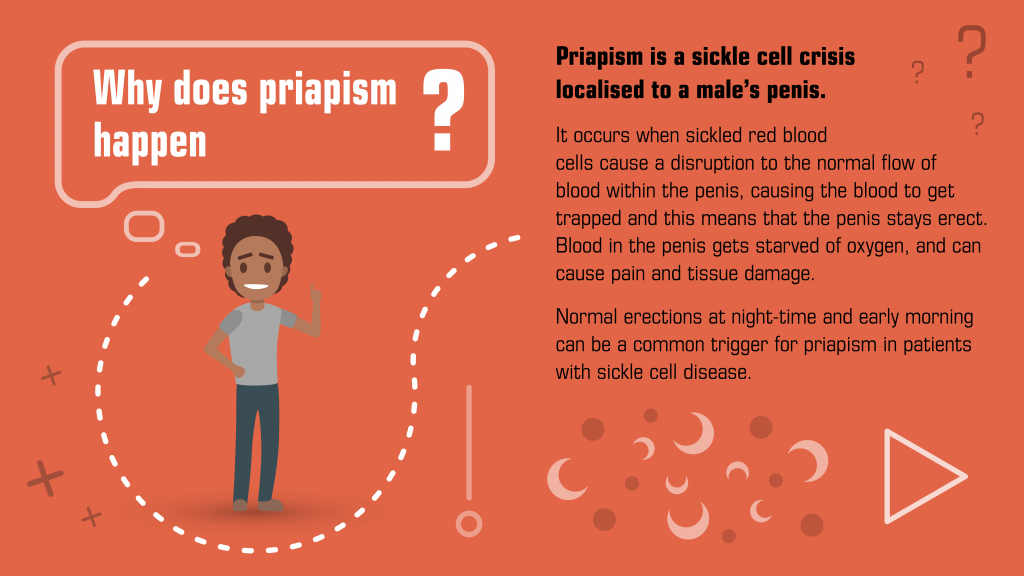
What are the risks from having Priapism?
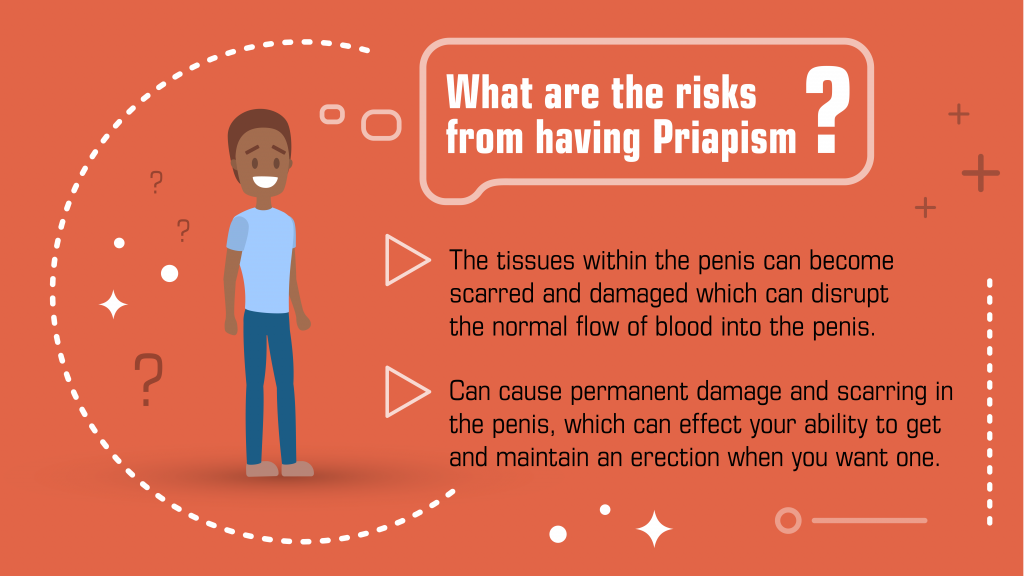
What can trigger a Priapism?
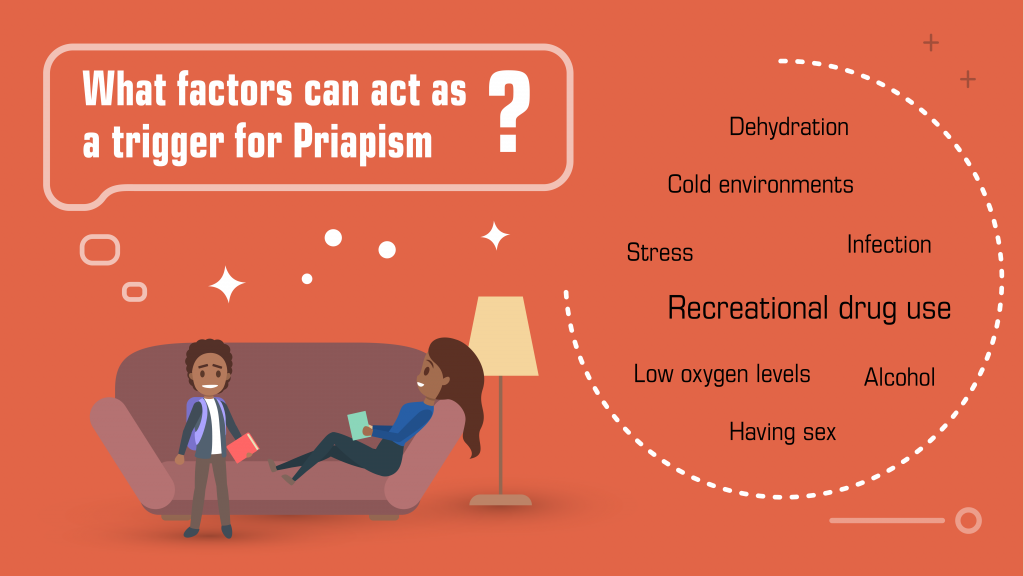
What time of the day or night am I likely to experience Priapism?
You are more likely to experience priapism during the night and early hours of the morning.
This can mean that your sleep is interrupted due to priapism, which can cause tiredness and can interfere with studies and work.
If you are losing sleep because of priapism, discuss this with your haematologist or specialist nurse as they may be able to recommend treatments and helpful strategies
What can I do at home to manage priapism?
Most people have developed different strategies for dealing with their own priapism.
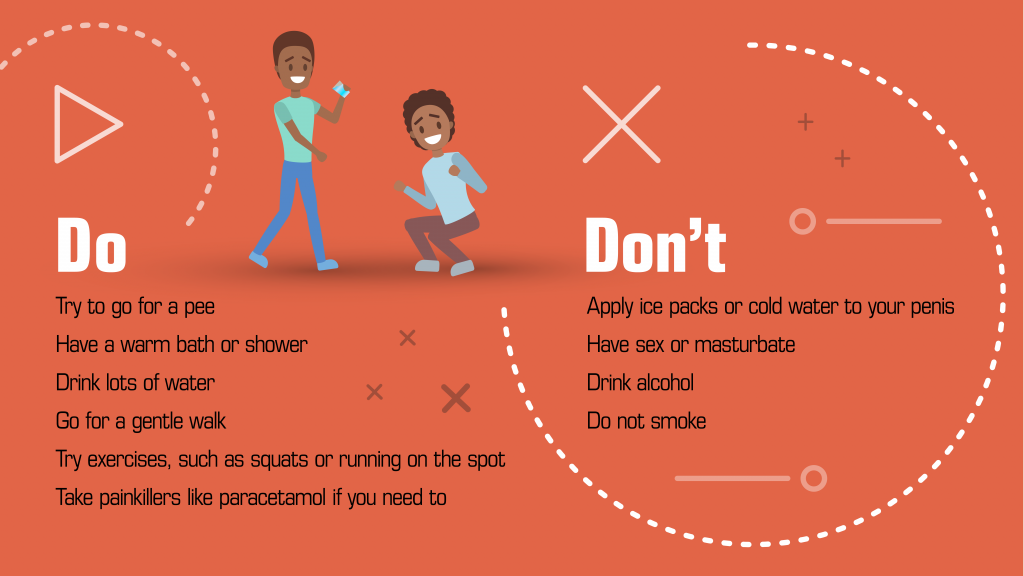
Males often report that the normal painkillers they use to treat their sickle cell crisis are not as effective in controlling the pain of priapism. Before trying a strategy for managing your own priapism it might be helpful to discuss it with your sickle cell nurse or haematologist.
What are some Key Facts about Priapism
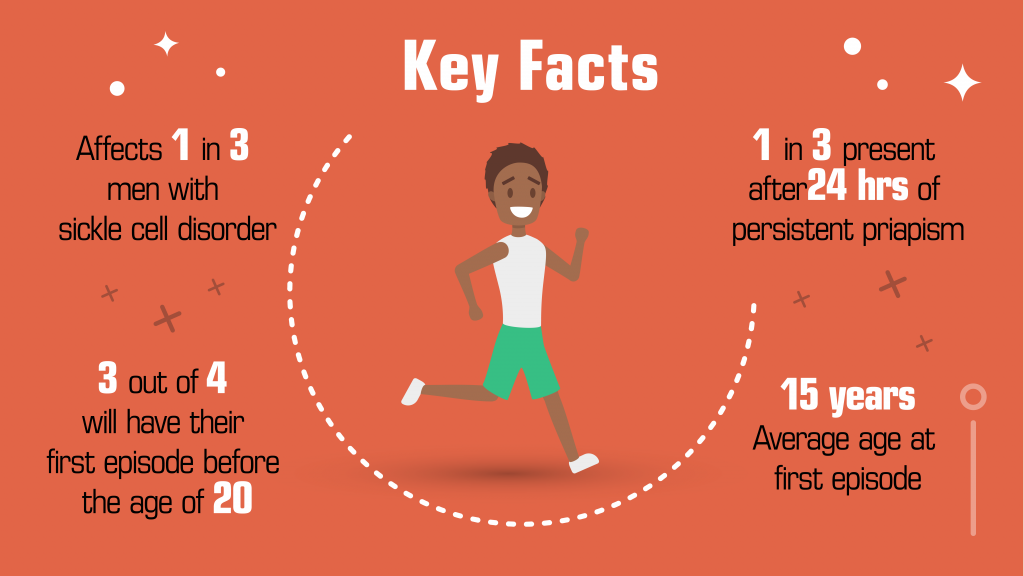
Why and when should I attend the Emergency Department with a Priapism?
If your priapism fails to respond to your normal treatment or strategies at home after two hours, you should go to the Emergency Department. Priapism which goes on for more than four hours is more likely to result in some long-term damage and erectile dysfunction.
The longer you remain at home with your priapism, the more likely it is that damage and severe pain in the tissue of the penis will occur. This increases the chances of tissue damage in the penis and loss of normal sexual function.
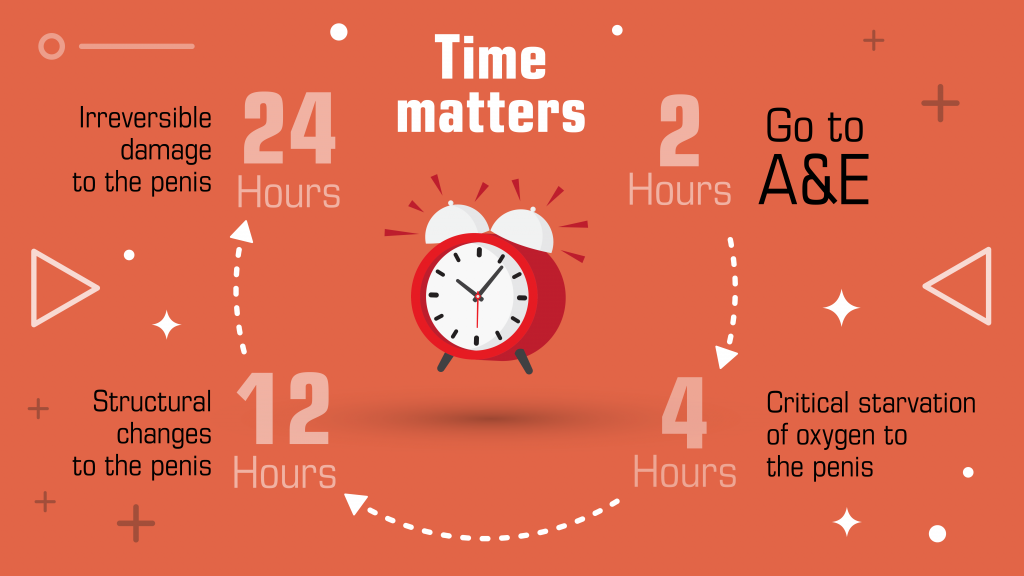
Attending A&E:
- Wear baggy jogging bottoms or loose underclothing because tight garments might aggravate the pain caused by priapism. Loose clothing will help you travel and will help you to disguise the nature of the problem when in public places.
- You must call an ambulance or arrange transport if the pain is severe and the priapism is not responding to your normal treatments and strategies.
- Once you arrive at the Emergency Department, inform the medical or nursing staff of the nature of the problem so that they can contact the SCD team and urologist. If you feel shy or worried ask for privacy.
- Priapisms that require you to attend hospital will be evaluated by your haematologist and a urologist and they will recommend treatments. These can include oral medications that can directly treat priapism and strong painkillers.
- In very severe attacks of acute priapism, the urologist may want you admitted for treatment injections directly into the penis, or aspiration (removal) of the sickle cell blood from the penis.
Although some of these treatments sound unpleasant, your urologist will make you as comfortable as possible. It is important to understand that your urologist is trying to prevent more severe and lasting damage, which can result in erectile dysfunction, and to treat this severe emergency.
While you are in hospital with a priapism you may also receive the common treatments that are used to manage a sickle cell crisis and this may include intravenous fluids, oxygen and antibiotics. In severe cases of priapism, exchange blood transfusions may be recommended by your haematologist. Surgery may also be required if the priapism fails to respond to the simple aspirations and injections by the urologist.
The earlier you go to the Emergency Department, the more likely it is that you will be treated successfully, which will reduce the risk of needing any surgery to solve the problem, or the risk of developing permanent erectile dysfunction.
Important note: In cases of priapism, time is function. Long delays will result in more damage and more severe erectile dysfunction.
Seeking Help
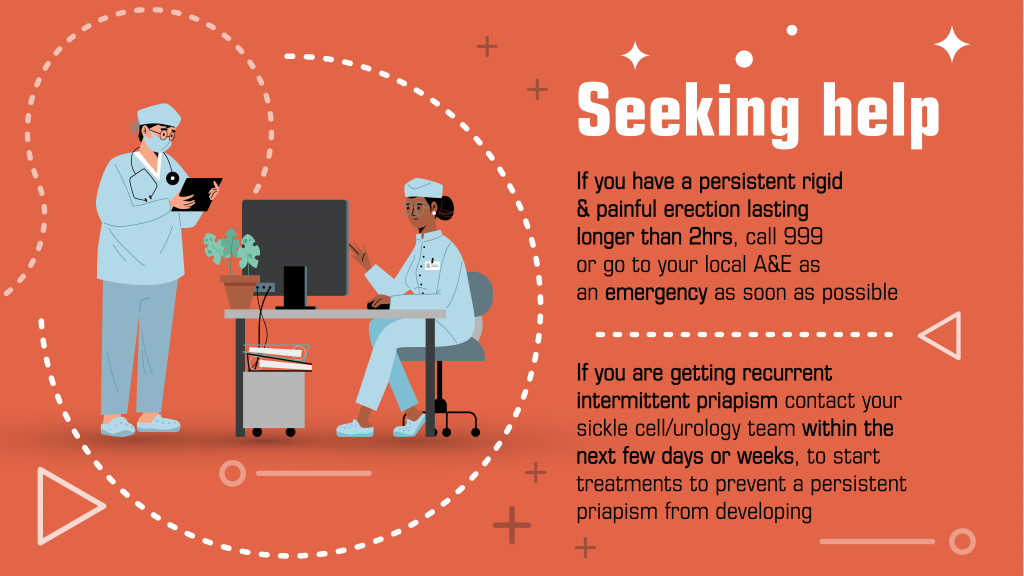
Sometimes you may not want to seek medical attention for priapism because of embarrassment, and practical difficulties such as getting dressed and travelling to the hospital in the early hours with a severe priapism.
You might be unaware of the treatments available, or perhaps you are fearful of about what might happen when they come to hospital and how doctors and nurses might react.
Many patients therefore seek information about priapism from family members and friends with sickle cell disease. However, many of these people may be unable to recommend suitable treatments or strategies due lack of up-to-date medical knowledge. Many patients find it difficult to discuss the issue with female health care professionals, partners and friends, and are anxious about how their sexual function might be affected in the future.
Here is some helpful information that you will need to know if you are coming to the hospital with a priapism:
- Ask for privacy in the clinic, ward or Emergency Department if you wish to discuss your priapism.
- Talk about your priapism and treatment options with your GP, sickle doctors, specialist nurse or psychologists.
- Ask to be referred to your region’s joint haematology/urology sickle cell priapism clinic if there is one available, in your area.
- Discuss helpful strategies and treatments with your haematologist or specialist nurse.
- Ask for written information about priapism and treatments.
- Call an ambulance if you cannot travel normally to the hospital because of the pain of priapism.
- Ask your haematologist or nurse specialist to explain this complication to your family or partner if you feel this would be helpful.
- If you are stressed because of priapism and the impact on your life, ask to be referred to the sickle cell psychologist as they are used to helping people live with this problem.
- Trying to find reliable information online about priapism may be difficult and could result in confusion. It’s best to discuss this health issue with your haematologist, urologist or specialist nurse.
Are there any treatments to prevent Priapism?
There are a number of common medicines that treat or prevent priapism. Your haematologist or urologist will talk to you about what is the best treatment to manage your type of priapism. It is important to understand that painkillers are not a direct treatment for your priapism, but will help you to manage the pain associated with this complication
During your review with the haematologist, the amount of painkillers you use and why will routinely be reviewed and if you or your haematologist has concerns about the amounts you are using, other treatments options for both the priapism and your sickle cell will be discussed.
If you are experiencing priapism episodes, you must mention this to your haematology team in clinic as they may recommend that you should be reviewed in our specialist priapism clinic.
NHS 111
Offers medical help and advice from fully trained advisers supported by experienced nurses and paramedics. Available over the phone 24 hours a day. t: 111
NHS Website
Online information and guidance on all aspects of health and healthcare, to help you take control of your health and wellbeing. w: www.nhs.uk
Why did I not know about Priapism?
Knowledge of this severe complication of sickle cell disease is often very poor. Many patients, parents and carers are not aware that priapism is a complication of sickle cell disease, or that there are risks associated with episodes of priapism. Patients are often reluctant to talk about priapism because of shyness and embarrassment.


